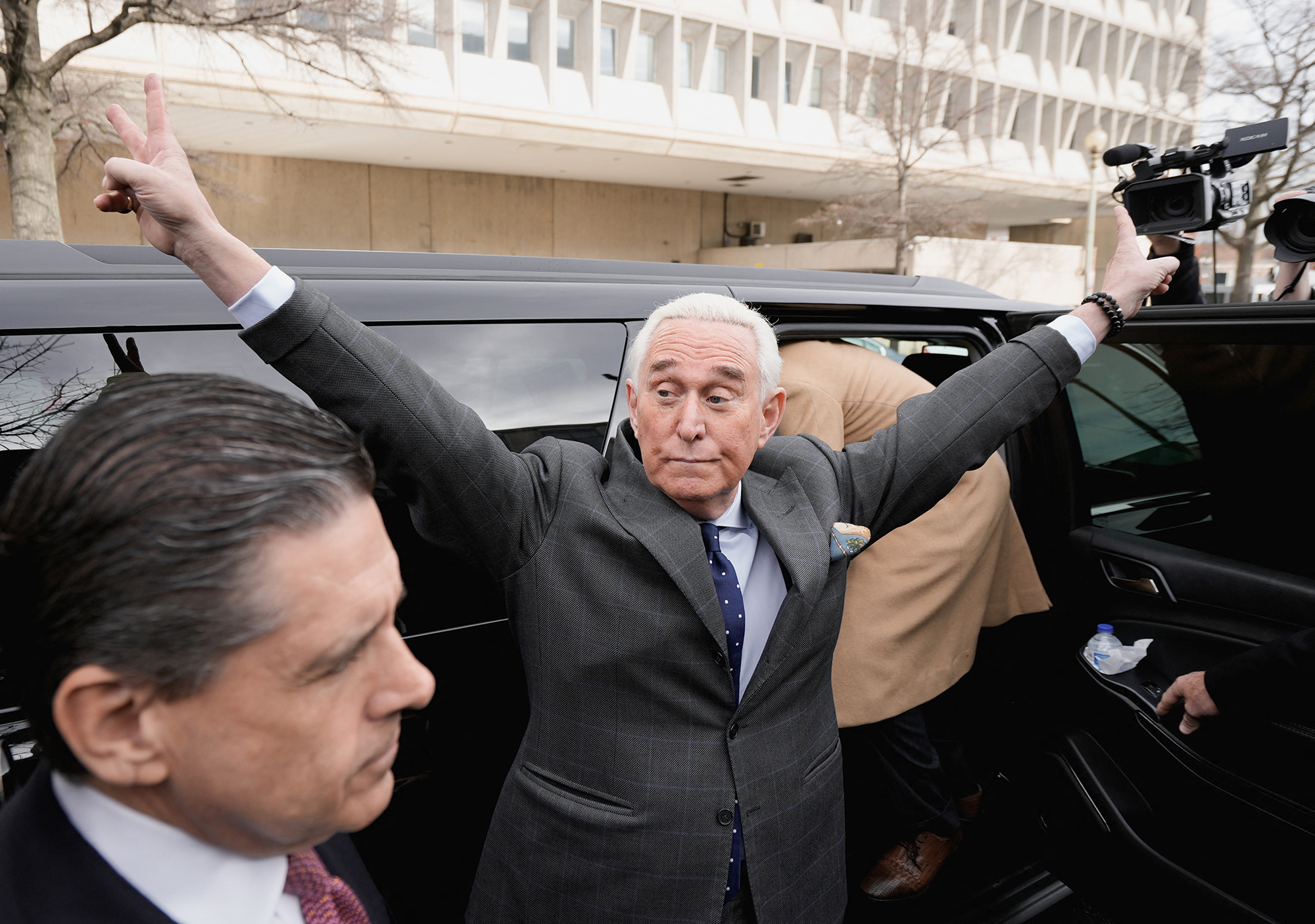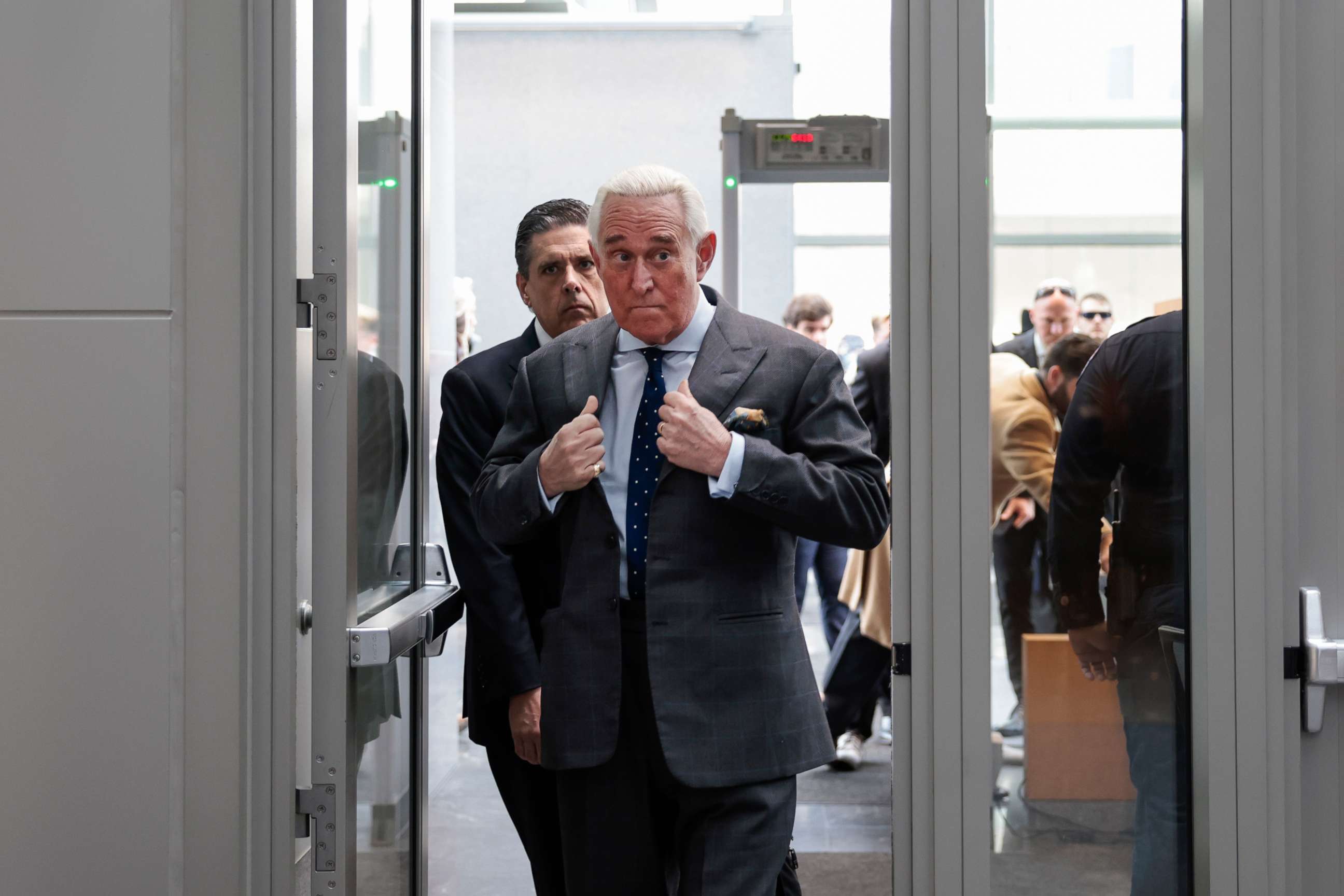Trump ally Roger Stone invokes 5th Amendment in appearance before Jan. 6 committee
Stone said he exercised his Fifth Amendment rights in response to all questions.
Roger Stone, longtime adviser to former President Donald Trump, appeared Friday before the House select committee investigating the Jan. 6 Capitol attack, where he said he invoked his Fifth Amendment right against self-incrimination in response to every question asked of him.
"I did invoke my Fifth Amendment rights to every question, not because I have done anything wrong, but because I am fully aware of the House Democrats' long history of fabricating perjury charges on the basis of comments that are innocuous, immaterial, or irrelevant," Stone said after emerging from his hour-long session with the committee.
The committee on Nov. 22 subpoenaed Stone for records and testimony, along with four other people linked to the planning of pro-Trump rallies in Washington on Jan. 5 and Jan. 6, prior to the Capitol attack.
Investigators are interested in Stone's involvement planning and attending the events, as well as his soliciting of donations to pay for security at the Jan. 6 "Stop the Steal" rally, the committee said.
Stone was also seen outside Washington's Willard Hotel on the morning of Jan. 6 with members of the Oath Keepers militia group, including some members who were later at the riot on Capitol Hill.

Stone has denied any involvement in the attack on the Capitol and has said he had no "advance knowledge" of the march on the Capitol or efforts to disrupt the counting of electoral votes.
"I stress yet again that I was not on the Ellipse [at the rally preceding the Capital attack]," Stone said following his appearance Friday. "I did not march to the Capitol. I was not at the Capitol, and any claims, assertion or even implication that I knew about or was involved in any way whatsoever, with the illegal and politically counterproductive activities of Jan. 6 is categorically false."
Stone also criticized the committee's probe into the Jan. 5 rally where he spoke.
"What disturbed me is an investigation into my activities on Jan. 5, which is constitutionally protected free speech, the constitutional right of free assembly, and the constitutional right to redress the government regarding grievances," he said. "I don't like to see the criminalization of constitutionally protected political activity. I think it is a slippery slope."
In February 2020, Stone was sentenced to 40 months in prison after he was found guilty of obstructing justice, witness tampering and five counts of lying to Congress in connection with special counsel Robert Mueller's investigation into Russian interference in the 2016 presidential election. However his sentence was commuted in July of 2020 by then-President Trump.
Also questioned this week by the Jan. 6 committee were Dustin Stockton and Jennifer Lawrence, two activists involved in planning the rallies in Washington ahead of the riot.
In an interview with CNN, Stockton said "the buck's got to stop at President Trump" and that he "knew better" than to rally supporters about the election results and encourage them to march on the Capitol.

Other witnesses, including Proud Boys leader Enrique Tarrio and Trump spokesperson Taylor Budowich had their sessions postponed as they "engage" with the committee over subpoenas for records and testimony, the committee said.
On Thursday, the committee subpoenaed Phil Waldron, a retired colonel linked to a controversial 36-page PowerPoint presentation titled "Election Fraud, Foreign Interference & Options for 6 Jan," that was prepared prior to Jan. 6.
A 38-page presentation with the same title that is available online includes several proposals for challenging and overturning the election results, including recommendations to declare a "national security emergency" or declare all electronic ballots "invalid."
The document also recommends that Vice President Mike Pence, who presided over the certification of electoral votes on Jan. 6, reject electors from states "where fraud occurred," and that he recognize alternate electors sent to Washington by GOP legislators, or that he delay the certification of the election.
A committee aide declined to comment on the document, which the committee obtained from former White House chief of staff Mark Meadows, including whether it resembled the presentation with the same name available online.
The committee has issued more than 50 subpoenas and conducted more than 300 interviews as part of its inquiry, and is expected to begin "weeks" of hearings in the new year, according to committee members.




